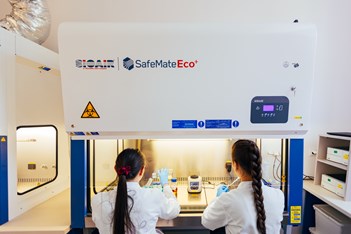Bacteriophages are the most numerous organisms on the planet. They are viruses which reproduce within a bacterial cell – killing the bacterium in the process.
Used in human therapeutic medicine in the early parts of the 20th century, phages eventually fell out of favor following the discovery and mass production of antibiotics. Now, as the world eagerly searches for highly effective alternatives to antibiotics both for humans and animals, the spotlight has turned once more to phages, which the World Economic Forum named one of the Top 10 Emerging Technologies of 2023.
Amid this growing interest, Proteon Pharmaceuticals, a Polish company specializing in phage-based prophylactic feed additives, seeks to secure its place at the cutting edge of phage research. To that end, has recently invested several million Polish zlotych to establish its Center for Bacteriophage Biotechnology (CBB). Today, we are joined by the company’s Chief Scientific Officer, Dr. Ewelina Wójcik, to learn more about what this will mean for the field as a whole, and what the industry should expect out of phage research going forward.
[Feedinfo] Can you briefly introduce the Center for Bacteriophage Biotechnology (CBB): its history, its equipment/capabilities, and its personnel?
[Dr. Ewelina Wójcik] The Center for Bacteriophage Biotechnology (CBB) was recently inaugurated by Proteon Pharmaceuticals in Łódź. This center represents a remarkable commitment to advancing the field of bacteriophage-based products and driving innovation within the industry. At CBB, we have established a state-of-the-art laboratory spanning 1600 m2, with a significant investment of nearly PLN 6 million. The facility is equipped with cutting-edge research instruments, including a pipetting robot, a sequencer, real-time PCR thermocycler, bioreactors, a tangential filtration system, and a microencapsulator, among others.
|
Our team of highly qualified scientists and researchers, numbering over 60 skilled professionals, is at the forefront of scientific discovery within the CBB. Many of these individuals are graduates of Łódź universities, renowned for their exceptional education in biotechnology, microbiology, and molecular biology. The geographical location of Proteon Pharmaceuticals in Łódź is a reflection of our historical roots, as we initiated our first research endeavors at the Łódź Campus of the Polish Academy of Sciences in 2008. Our close collaborations with local universities and research institutes continue to enrich our scientific pursuits. |
Dr. Ewelina Wójcik |
The core mission of the CBB revolves around harnessing the antibacterial properties of bacteriophages, with the aim of shaping a future of sustainable health solutions. As a global leader in bacteriophage technology, Proteon Pharmaceuticals is dedicated to redefining animal health and food safety paradigms. Our bacteriophage products show tremendous potential in reducing antibiotic usage in animal farming, which not only safeguards animal health but also improves economic performance. Moreover, our commitment to limiting antibiotic usage within the human food chain significantly contributes to human health.
[Feedinfo] What specific research objectives does the CBB have?
[Dr. Ewelina Wójcik] At the CBB, our research is strategically focused on several pivotal areas.
In delivering bacteriophages to solve health problems mainly in food animals, the commercial nature of our products plays one of the most important roles. That’s why, when designing new products, we take into account not only features directly related to the bacteriophages’ nature but also features related to the final products which will be delivered to the market. This is top-of-mind throughout the process, from the starting point of collecting bacteria and bacteriophages, through the processing of selecting cocktail components, the design of a product formulation, and the trials of in vitro and in vivo safety and effectiveness.
|
Inside the Center for Bacteriophage Biotechnology |
One of our primary pursuits involves the comprehensive characterization of bacteriophages. We delve deep into understanding their properties, interactions, and genetic makeup. By deciphering their host range, specificity, and mechanisms of action, we identify bacteriophages with exceptional potential to combat specific bacterial infections. |
Equally crucial is the development of effective bacteriophage formulations. Our research revolves around refining delivery methods, enhancing stability, and extending shelf life for bacteriophage products. This optimization ensures that these products can be efficiently administered and stored, maximizing their impact across diverse applications.
Additionally, our research addresses a pressing concern – antibiotic resistance. We study how bacteriophages can effectively counteract antibiotic-resistant bacteria. This research is vital in combating the growing threat of antimicrobial resistance and preserving the efficacy of existing treatments.
Overall, the research objectives of the CBB are rooted in the need to advance our understanding of bacteriophages and translate that knowledge into practical solutions for pressing challenges in animal health, food safety, and sustainable biotechnology.
[Feedinfo] Phage research is attracting a growing amount of attention. What role do you believe the CBB should play in facilitating cooperation between teams working in different institutes?
|
[Dr. Ewelina Wójcik] Indeed, along with the growing attention on phage research comes the growing importance of fostering collaboration and knowledge exchange among teams situated in different institutes. The CBB recognizes its pivotal role in facilitating such cooperation to collectively advance the field. |
Outside the CBB |
Within the framework of the CBB, we envision ourselves as a focal point for collaboration, a place where researchers, scientists, and experts from various institutes can converge to share insights, ideas, and resources. In addition, having extensive experience in the registration of bacteriophage preparations, we see our role in establishing methodology and shaping the standards of work on bacteriophages, which are not yet defined by registration agencies. Our mission is grounded in a broader objective – not just individual accomplishments, but the profound potential of bacteriophages for transformative solutions.
[Feedinfo] You assert that BAFASAL® is the first phage product to have progressed so far in registering as a feed additive in the EU. What can you tell us about that journey? How soon might we see full registration for that product, or future phage products?
[Dr. Ewelina Wójcik] Since 2017, BAFASAL® has undergone meticulous evaluation, demonstrating its safety and efficacy as a feed additive targeted at Salmonella in poultry. The journey has included intensive scrutiny by the European Food Safety Authority (EFSA). In 2021, the product received approval for its safety and quality, in full compliance with stringent EU standards. This laid a strong foundation for subsequent evaluations.
In early 2023, we received a pivotal opinion from EFSA confirming BAFASAL®'s efficacy against various Salmonella serotypes. This affirmation, following the prior safety and quality approval, is a significant step towards achieving full registration. The thorough assessment and validation process have highlighted the immense potential of bacteriophages in combating bacterial pathogens, setting a precedent for their use in feed additives.
BAFASAL®'s approval in the EU is poised to be a groundbreaking achievement. It serves as a template for the development of future phage products, not only in poultry, but also in other food-producing animals, companion animals, and humans. As we anticipate this milestone, we recognize that the journey of BAFASAL® will pave the way for innovative solutions to address a wide range of serious bacterial pathogens.
[Feedinfo] Is it fair to say that the wider world is increasingly appreciating the importance of phages for animal (and human) health? What about phages make them an attractive tool to reduce the use of antibiotics and preserve their efficacy?
[Dr. Ewelina Wójcik] Absolutely, the growing global appreciation for the importance of bacteriophages in promoting animal and human health is undeniable. Bacteriophages are gaining recognition as a potent tool to prevent bacterial infections. Phages possess an exceptional ability to precisely target specific strains of pathogenic bacteria, while leaving beneficial bacteria untouched. This selective action minimizes disruption to the natural microbiota, crucial for overall health. By employing phages into preventative strategies performed in animal health, we can substantially decrease unnecessary antibiotics use. This reduction is pivotal in mitigating the risk of antibiotic resistance, preserving the utility of antibiotics in human and veterinary medicine.
Bacteriophages operate uniquely, making them formidable contenders against antibiotic-resistant bacteria. Their efficacy extends to strains that have developed resistance to antibiotics, addressing a pressing global health concern. Phages exhibit a remarkable ability to rapidly adapt to changes in bacterial populations. This adaptability ensures their effectiveness remains potent as bacterial threats evolve.
Moreover, the utilization of phages aligns with eco-conscious goals, as it diminishes the environmental impact associated with antibiotic overuse, such as antibiotic residues and microbial imbalances. In essence, the multifaceted benefits of phages position them as a compelling strategy to curtail unnecessary antibiotic usage while preserving their efficacy.
[Feedinfo] Can you talk a bit about the benefits and impacts of Proteon's phage technology, specifically? How are your R&D efforts organized to keep Proteon at the forefront of this quickly-growing field?
[Dr. Ewelina Wójcik] Proteon Pharmaceuticals’ distinctiveness lies in the development of a precision phage product platform that harnesses -omics technologies, molecular biology, bioinformatics, and artificial intelligence (AI). This combination of cutting-edge disciplines empowers us to craft solutions that are not only effective but also reliable and safe, setting new standards for disease mitigation.
One of our core strengths lies in our extensive experience, with over 18 years of unwavering commitment to advancing bacteriophage technology. Our expertise is complemented by our well-equipped laboratories and the recent establishment of the Center for Bacteriophage Biotechnology, a testament to our dedication to remaining at the forefront of innovation.
Our exceptional team of scientists is central to our success. The recruitment of top-tier researchers amplifies our R&D capabilities, enabling us to push the boundaries of what is achievable in the field. This dynamic team forms the bedrock upon which our advancements are built.
As a trailblazer, we have been quick to seize opportunities on the global stage. Our proactive approach has led us to be among the first companies worldwide to not only develop but also successfully commercialize our products across diverse markets. This expansive outreach underscores the practical significance of our research and technology.
[Feedinfo] What kind of developments in global phage research are you most eagerly anticipating? What kind of work is underway from Proteon on these efforts?
[Dr. Ewelina Wójcik] The developments in global phage research that I am particularly eager to witness revolve around the expansion of phage applications and the realization of their full potential in various sectors of health and biotechnology.
One of the most compelling developments is the expansion of phage therapy applications. At Proteon, we're actively expanding our product portfolio to target diverse bacterial pathogens in animals and humans. The key here is the ability to quickly isolate new bacteriophages with therapeutic potential, which is not trivial. At Proteon, we have developed a method of rapid screening of bacteriophages (so-called HTS from high-throughput screening), in which we are able to qualify bacteriophages for further stages of product development at an early stage of isolation. By characterizing new phages and developing innovative therapeutic solutions, we aim to address infections that resist traditional treatments. The urgent challenge of antibiotic resistance is driving pioneering research efforts. Our team at Proteon is dedicated to contributing to this global effort. Our research focuses on harnessing phages' potential to counter antibiotic-resistant bacteria while refining formulations for greater effectiveness against resilient strains.
The emergence of precision medicine is an exciting frontier for phage research. Customizing phage therapies based on individual profiles can maximize efficacy and minimize unintended effects. Here, the solution for us are tools based on machine learning and artificial intelligence, which allow us to quickly obtain reliable information on the functional properties of our bacteriophages.
Beyond therapeutics, the potential of phages in diverse fields like agriculture and food safety is intriguing.
At Proteon, we are actively developing phage-based solutions for animal farming. Our efforts contribute to enhanced animal health and a reduction in unnecessary antibiotic use, addressing critical challenges in sustainable agriculture. Innovations in phage formulation and delivery techniques are pivotal for translating research into tangible impact.
The global phage research landscape is evolving rapidly. Through our research initiatives, collaborations, and cutting-edge technologies, we are committed to harnessing phages' transformative potential. Our goal is to drive innovation, reshape disease prevention strategies, and usher in a new era of improved animal and human health.
Published in association with Proteon Pharmaceuticals






